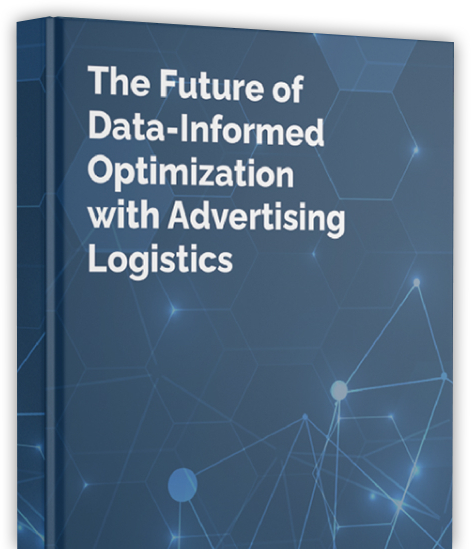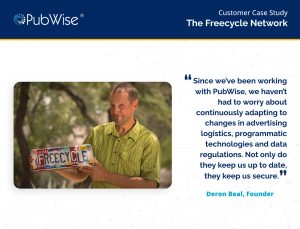Description
In this episode of On The SPOT podcast, hosts Stephen & Tony dive into the origin, evolution and innovation of PubWise. Find out how we applied our collective experience from video gaming to changing the game with a publisher-first programmatic platform, built by publishers, for publishers.
Transcript
Tony Winders: And we’re back with Stephen Johnston, CTO and Founder of PubWise, Stephen, great to see you again, eager to put you on the spot. And today we’re going to talk about the origin story of PubWise, I know you’ve come from a gaming and publishing background and I know PubWise first introduced header bidding as a service. But, I’d love to just hear in your own words, how this thing got started?
Stephen Johnston: Sure, thanks for talking today. How we got started, it’s kind of a multi-layered thing, really. So without going back to kindergarten, I’ll at least go back to the first company that we started in 2006. We started Guild Launch, and hosting for guilds and clans inside of massive multiplayer online games. Primarily World of Warcraft, and that product grew along with World of Warcraft’s boom at the time in 2006 and beyond. We grew that to millions of registered users. This is pre-cloud or physical hardware, we were ordering database hardware ahead of growth, it grew fantastically. But in 2012, we wanted to expand out and to get more broadly into the gaming industry. And we started a publishing platform called Game Skinny, we rebranded the whole package as Launch Media Network and we were focusing on this sort of millennial gaming lifestyle, sort of publishing and platforms. My background is primarily Big Data and big data before it really had a name, data processing and processes and support and how to manage teams to do support. So, building SaaS platforms was sort of secondhand at this point, and we’ve managed one for a number of years. So, as we continued to look at how we monetize Launch Media Network as a whole, we started hearing about header bidding. And we started evaluating platforms that were out there, and there really wasn’t one, there were a couple of offerings that were script-based, but they weren’t managed, they weren’t really packaged up as something you could turn on and centrally manage, code deployments, all these sorts of things. So we really felt like our experience in SaaS, our experience in automated platforms, our experience in customer-driven software, where it isn’t just an enterprise managed ticket based system, but building systems that regular users can leverage. Header bidding really met a combination of a confluence of things there and so we decided that we were just going to leverage that experience and build a platform to deploy header bidding. And the mantra really became, deploy, manage, and optimize header bidding deployments and that was the first header-as-a-service platform.
Tony Winders: What was the alternative to that? Like, you would have to have engineers code up your header bidding? What would a publisher do otherwise?
Stephen Johnston: They would do it themselves. Prebid was available at this time, it was pretty new but it has complex configuration, new options coming out all the time, new versions coming out. At that time, they’re coming out monthly now they’re even coming out faster. I think they’re on almost a two week cadence at this point. The capabilities inside of Prebid change all the time so you have to keep on top of that. Or you use a couple of these Prebid-like things that were available through Index or OpenX that weren’t open source, and they were managed wholly by an SSP relationship. And our feeling was that we wanted to put that data and that capability back into the publisher’s hand and use open source and so Prebid was our choice. It’s since been proven to be the winner in the space and then we provided all of the reporting in the dashboard that the customer could see. So, we provide two sorts of platforms: one, they drive themselves, and they use the tools that we built to make optimization decisions on top of the machine learning. And then another one, that we work as a yield manager and drive the software on their behalf. More as a traditional SSP kind of relationship, we will make you more revenue and manage the whole thing. But if you want to run it yourself, we’ll give you that too. As far as what data is available to those two groups, there’s really not any difference. There’s no black box, there’s no hidden decisions, there’s no closing price, first price you see, it’s all just right there, in the UI and in the deployment. So we kind of fixed the market reality of either a black box, or run it yourself. And that’s the traditional sort of SaaS pitch, control it a little more, see it a little bit more, understand how it’s operating a lot more. Then we stepped in as a partner to help you do that, and provide various levels of service.
Tony Winders: So what year was that?
Stephen Johnston: 2017.
Tony Winders: And how was it received in the market? Was it word-of-mouth through different ad tech channels? Or how did you go to market with that? And how did it take off?
Stephen Johnston: Our primary channel has been word of mouth, largely publishers we worked with talk to their friends who are looking for similar services who recommend us and the value proposition has always been pretty clear. The reality of building something in the way that a publisher would build it, if they could. If you could build all this technology, deal with all this data, were really close to how you would choose to build it, versus, how a software company or traditional SSP might build it, where they provide a very thin layer of data. It’s really just, what’s the check we’re going to cut you or difficult reporting. So word-of-mouth has always been really good for us. We have a really high retention rate and a really high close rate in terms of people we talk to, get it, test it out, and then stay with us.
Tony Winders: The stars really aligned for you. Not every publisher has the technical wherewithal to see something and build the solution and the image of what a publisher would like. That sort of special circumstance, it seems like, and now you’re doing it again, you’re evolving, again, with how PubWise is now, kind of going to a different level beyond header bidding as a service. I’d love to hear you talk about that, too.
Stephen Johnston: Our philosophy has always been that you can get into these sorts of ratios and the breakdown is the primary driver of this, of what we choose to build should be what provides value to our customer. Then, of course, there’s strategic elements inside of there, the customers may not know, or may not yet see a future that we see. And of course, we want to continue guiding towards that. Primarily, we’re driving based on pain points we felt ourselves as a publisher or pain points that we hear out of our customers, and then say, okay, if that’s the nugget of a concept, where is its logical conclusion that provides the most value? So we’ve been working from the supply side, from the in page, the client JavaScript Prebid, that whole deployment, up the supply chain, to buyers, and basically to just close that loop. Bring buyers to our supply, bring supply to our buyers, they both win, the buyer maybe spends a little less, because there’s less players between them. The publisher makes a little bit more because of the same reason. That reality aligns everyone’s goals and it doesn’t align it with tricks, it aligns it with just clear fundamental supply chain realities. It’s like a logistics question. It’s like, if you put it through 97 hands, everybody’s got a mouth to feed. If you put it through two or three or four…if you got the buyer, the publisher and us, that’s three, there’s not much more you really need. Once you deploy a DSP as we have, once you deploy an open RTB platform like we have, and once you have the client side, now we can push first party data through, we can help our customers maintain the value of that first party data. We can help our buyers understand that first party data is real, because it hasn’t gone through 27 hands and different interpretations in this game of telephone before it gets to them. So, that’s where we’ve evolved now, we had this really good position on the sell side and how do we leverage that? You can go one step but once you go one step, you should just go all the way, in my opinion. And of course, there’s still a pragmatic reality, we’ll plug anybody in that provides value. So we still maintain our relationships, all the SSPs, we plug in other DSPs to the platform, everybody gets connected, where they provide the most value and optimize in the way they provide the most value to both sides, the buyer and the seller.
Tony Winders: Where do you see it going from here? We started with the origins, where do you see PubWise in the years ahead?
Stephen Johnston: I think that we’re going to see changes in cookies and targeting. And I think we’re in a unique position to adapt to the future. I think that as much change as there has been in advertising, we’re likely to see more over the next couple of years. And I think we’re uniquely positioned to adapt to that change. So, I think where we are in the future isn’t just client to buyer, it isn’t just connectivity of the systems. But we’re in a position to have an adaptable, intelligent system that’s reacting to these changes that we’re going to see. And I really just see a lot of value provided to both sides of the transaction, the buyer and the seller. That’s what I hope for in terms of where I see the company growing is just an ever increasing value to both sides of the transaction. And of course, that means more value for the company.
Tony Winders: Great, well, that was a nice concise telling of the PubWise story. I appreciate you taking me through that and that concludes another On The SPOT with Stephen Johnston, Founder and CTO of PubWise. Thanks and I look forward to our next conversation.
Stephen Jonnston: Thanks!





